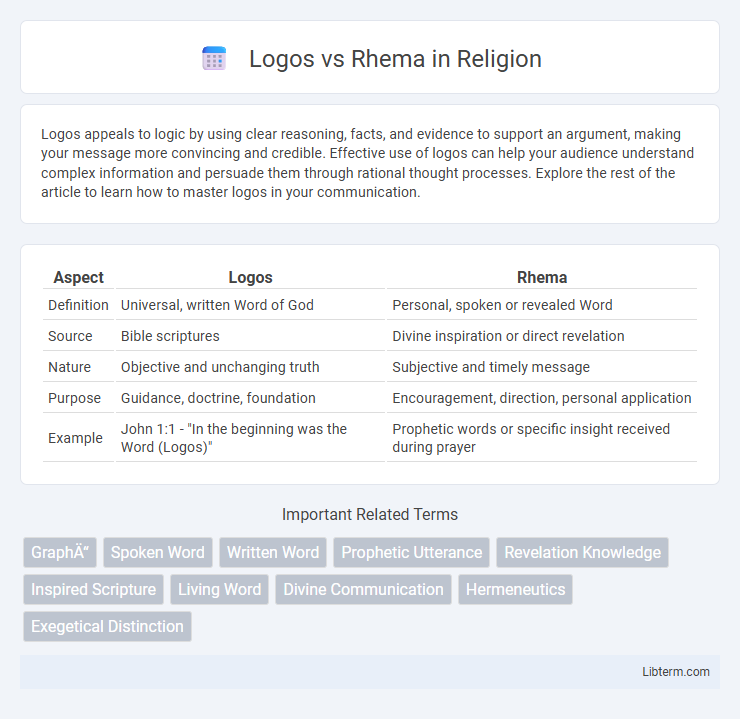Logos appeals to logic by using clear reasoning, facts, and evidence to support an argument, making your message more convincing and credible. Effective use of logos can help your audience understand complex information and persuade them through rational thought processes. Explore the rest of the article to learn how to master logos in your communication.
Table of Comparison
| Aspect | Logos | Rhema |
|---|---|---|
| Definition | Universal, written Word of God | Personal, spoken or revealed Word |
| Source | Bible scriptures | Divine inspiration or direct revelation |
| Nature | Objective and unchanging truth | Subjective and timely message |
| Purpose | Guidance, doctrine, foundation | Encouragement, direction, personal application |
| Example | John 1:1 - "In the beginning was the Word (Logos)" | Prophetic words or specific insight received during prayer |
Understanding Logos and Rhema: Semantic Foundations
Logos represents the divine word as a universal, unchanging principle encompassing reason and truth, rooted in the original Greek meaning of "word" or "account." Rhema signifies the specific, spoken or revealed word given directly to an individual, emphasizing dynamic communication and personalized insight. Understanding logos and rhema highlights the semantic distinction between the eternal, doctrinal truth (Logos) and the timely, situational message (Rhema) within theological discourse and biblical interpretation.
Historical Roots of Logos and Rhema in Theology
The historical roots of Logos in theology trace back to Hellenistic philosophy, where Logos represented divine reason and order, later adopted in Christian thought as the pre-existent Christ embodying God's wisdom. Rhema, derived from the Greek word for "spoken word," developed in early Christian contexts emphasizing the dynamic, momentary utterance of God's message to individuals. These concepts together reveal a nuanced understanding of divine communication, with Logos as the eternal, universal truth and Rhema as the personalized, immediate revelation.
Defining Logos: The Written Word
Logos refers to the written word or the recorded Scripture that conveys divine truth in a structured, permanent form. It represents the objective, unchanging message of God as found in the Bible, providing a foundation for faith and doctrine. The Logos serves as the authoritative source that guides spiritual understanding and moral conduct.
Exploring Rhema: The Spoken or Revealed Word
Rhema refers to the specific, spoken, or revealed word from God that conveys immediate and personal guidance, distinguishing it from Logos, which represents the written or universal Word of God. In Christian theology, Rhema is often experienced as a fresh, dynamic message delivered through the Holy Spirit, providing direct insight or instruction relevant to an individual's current situation. Exploring Rhema emphasizes its role in spiritual growth, inspiring believers to respond actively to divine communication beyond the scriptural text.
Key Differences Between Logos and Rhema
Logos refers to the written or spoken Word of God, embodying the eternal, unchanging truth found in Scripture, while Rhema signifies the spoken or revealed Word, often experienced as a personal and timely message from God. Logos represents the objective, foundational truth accessible to all believers, whereas Rhema is subjective and specific, providing dynamic insight or guidance tailored to a particular situation. Understanding the distinction highlights how Logos offers doctrine and principle, while Rhema delivers direct application and inspiration for individual circumstances.
Theological Significance of Logos and Rhema
The theological significance of Logos centers on its representation as the divine, eternal Word of God, embodying God's rational principle and creative power as revealed in Scripture and in the person of Jesus Christ. Rhema, on the other hand, emphasizes the dynamic and personal aspect of God's Word, often understood as the specific, timely utterance or revelation imparted to believers through the Holy Spirit. Understanding Logos and Rhema enriches Christian doctrine by highlighting the distinction between the universal, unchanging truth of God's message and its immediate application or revelation in an individual's spiritual experience.
Logos and Rhema in Biblical Context
Logos in the biblical context refers to the written Word of God, embodying divine truth as revealed in Scripture, especially in the Gospel of John where it signifies Jesus Christ as the incarnate Word. Rhema denotes the spoken or revealed Word, conveying specific, timely messages from God to individuals, often through prophecy or personal revelation. Understanding Logos as the eternal, unchanging source and Rhema as its dynamic, situational application highlights their complementary roles in Christian faith and practice.
Practical Applications of Logos and Rhema in Everyday Faith
Logos refers to the written Word of God, serving as a stable foundation for faith through scripture, while Rhema represents the living, spoken word that applies God's promises directly to an individual's situation. Practically, believers use Logos to study Bible passages systematically for guidance, whereas Rhema manifests in moments of prayer or inspiration, offering timely encouragement and direction. Integrating Logos with Rhema enhances everyday faith by balancing doctrinal understanding with personal spiritual insight.
Common Misconceptions About Logos and Rhema
Common misconceptions about Logos and Rhema often confuse Logos as merely the written Bible and Rhema as spontaneous words from God, overlooking that Logos encompasses the entire divine Word, both written and incarnate, while Rhema represents specific, timely revelations. Many assume Rhema is superior or more direct than Logos, but both function complementarily--Logos provides foundational truth, and Rhema offers personal application and insight. Misunderstanding this distinction can lead to either disregarding scripture in favor of subjective experiences or rigidly adhering to text without seeking personal divine guidance.
Integrating Logos and Rhema for Spiritual Growth
Integrating Logos and Rhema fosters deeper spiritual growth by balancing the comprehensive truths of Scripture (Logos) with the personalized, timely revelations of God's word (Rhema). This integration enables believers to apply biblical principles practically, enhancing faith and obedience through both study and divine inspiration. Embracing both dimensions cultivates a dynamic relationship with God, promoting transformation and maturity in one's spiritual journey.
Logos Infographic

 libterm.com
libterm.com